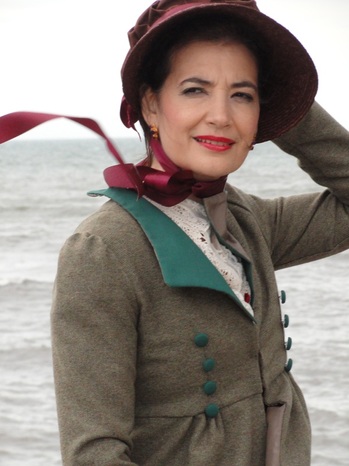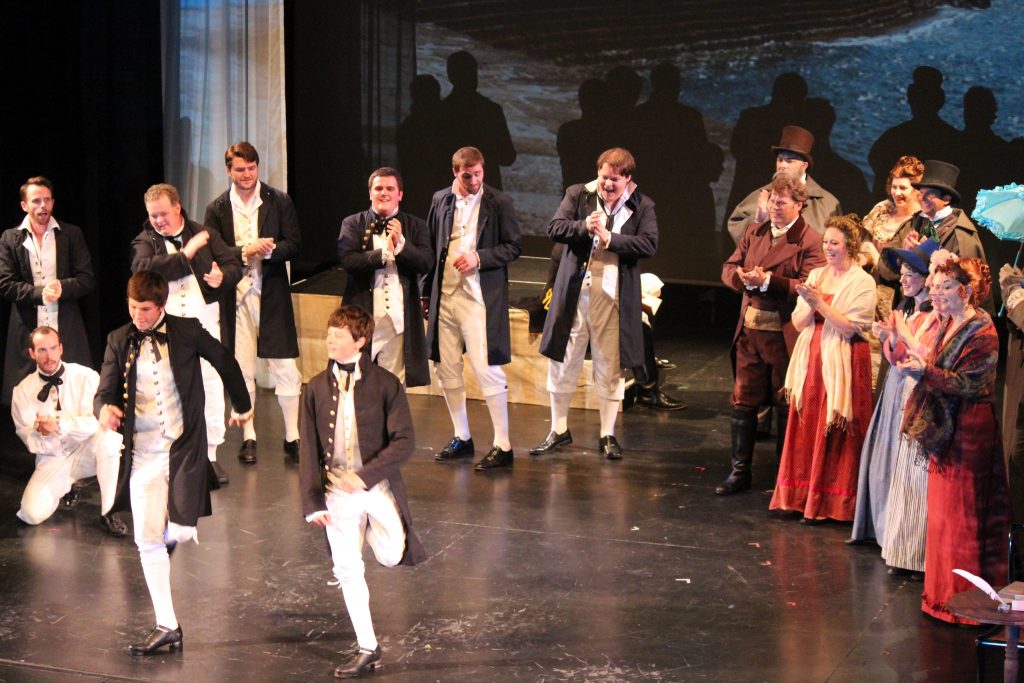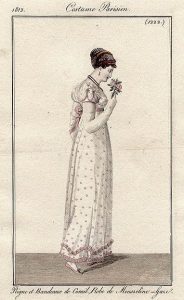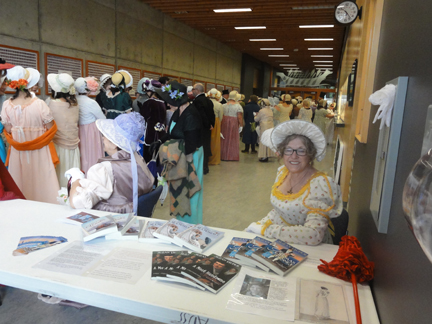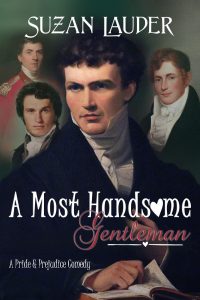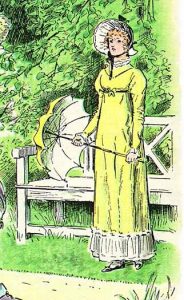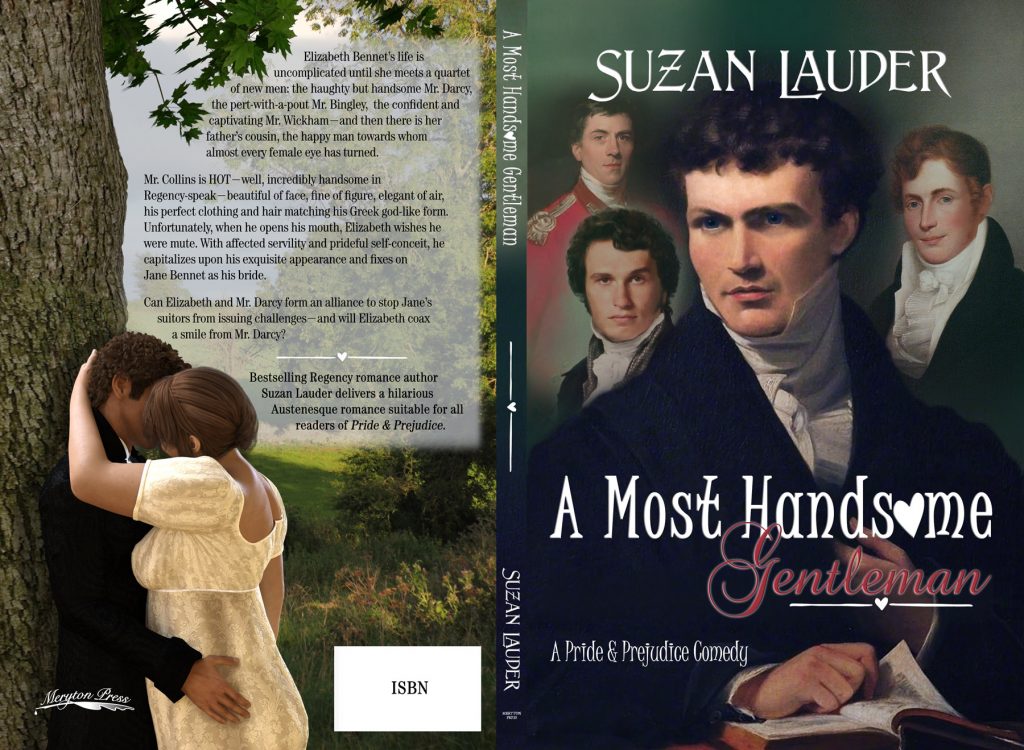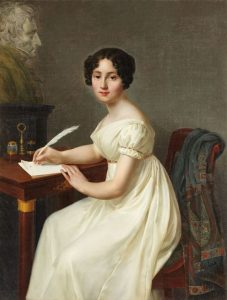With my frequent posts about typing “The End,” readers can be forgiven for wondering which book is coming out first. Because the novellas for my Regency romance series are around 40k words each, I’ve finished writing three books over the last year. The one that’s slated to be available for pre-order from Meryton Press on May 2 is the Austenesque The Barrister’s Bride.
The Barrister’s Bride was written when I was having trouble writing the middle book of the Regency romance series (the trilogy might have four books, so I’ve started to call it a series). I often find that if my muse doesn’t work, writing something else, even if it’s a short story, will help get me started again. The jump-start on the muse worked. I finished the middle novella and wrote the third within the last year, after writing the much longer The Barrister’s Bride.
I suppose you’re curious about all these books. Since The Barrister’s Bride is the book coming out first, it’s the one featured in today’s post.
The barrister in question is Fitzwilliam Darcy, a second son. His older brother, George, is a bad boy. In fact, the two Georges—Darcy and Wickham—are fast friends who are up to no good in this 120k word novel. We wish they would keep to the sidelines, but like a pair of bad pennies, they keep turning up. In the meantime, Fitz, as he is called, has met and become friends with Elizabeth Bennet, whose father passed away six months ago. Fitz and Elizabeth have something in common: they both have had marriages arranged for them, sight unseen, that will take place upon the lady’s majority. Although Fitz has known this for some time and has become accustomed to his fate, Elizabeth only recently discovered about her situation and is not certain what to make of her father’s decision to take away her chance at marrying for love. Of course, that’s the basis of the conflict within the story, and much more happens to liven up the book and make it a real page-turner.
Meryton Press marketer, Janet Taylor; my editor, Leigh Stewart; my British beta, Anji; and Mr. Suze all agree: The Barrister’s Bride is my best book yet. I’m quite honoured by their view since readers seem to think others of my back list are pretty darn good reading, given the positive comments I’m honoured to receive all the time. I do hope you get your copy soon and enjoy devouring the fresh new story on release day, May 9.
If you’d like your paperback of The Barrister’s Bride personally signed, there are two great ways to do so: win the one that I’ll be offering, along with some unique items, as part of the author’s prize (international) for the blog tour (May 9-16), or come to the JASNA AGM in beautiful Victoria, BC September 30-October 2, 2022 to get one signed. The theme for the AGM is Sense and Sensibility in the City of Gardens, and you can meet me there while I’m selling and signing all my books. Either choice sounds like tons of fun!
Here is a short excerpt from The Barrister’s Bride:
“Fitz!”
He jolted at his name spoken in a loud tone near his shoulder and turned to a laughing Bingley.
“Forgive me, but I have said your name three times without a response.” Bingley tilted his head in the direction of his fascination. “Are you acquainted with the lady?”
He nodded and cleared his throat so he could speak without mortification. “Yes, she is Miss Elizabeth Bennet. We collided with one another whilst she searched for her sister in Hatchards, and her uncle, a Mr. Gardiner, introduced us. Gardiner is a congenial fellow who has no estate but supports himself in textiles if memory serves me correctly.” He had been impressed with all of them, but especially Miss Elizabeth. She was now his goddess.
“The ladies’ father died last Easter. His estate, Longbourn, near Meryton, was entailed to a distant cousin. A pity, and my heart broke for the ladies.” Bingley nodded, his mouth more severe than usual. Both men had lost their parents. They knew well the enormous grief associated with the death of a close family member. “At the time we met, I had no idea your leased estate was so close to this small market town, else I may have made mention of that point during the polite discussion that followed our introduction.” That information would not usually have been missed by a man such as Fitz (as his friends called him). He possessed a mind that captured details and never forgot them—not a one.
The intelligent glow within Miss Elizabeth’s eyes when she gazed into his was one of those fine points. She was blessed with a strong will and astute mind behind that uncommon yet pretty face. As soon as he became aware that Bingley’s estate was near Meryton, Fitz’s thoughts were consumed with whether he would have the opportunity to meet her again—and tonight was his chance. Now, how was he to go about approaching her? A reserved sort, he had never been as socially oriented as his older brother, George. Some might have even called him shy. His diffident nature never mattered to him in the past. He had always been sought out for friendship for no other reason than he was a Darcy, a name that was important amongst polite society. He was fortunate to have come to his age of seven and twenty years without becoming too prideful. Vanity had not escaped George’s personality. Fitz scoffed in his head. His brother was an example of most of the older brothers in England—filled with a sense of importance they justified by their position of power and wealth. George would use that confidence to march right over to Miss Elizabeth and request a set. He would not stare at her from across the ballroom, debating his next step; but like a dunderhead, Fitz continued to do just that as he mulled over stupid thoughts of his scoundrel older brother. Why was bravado not a quality he possessed? His lack of assertiveness compared to others seemed unfair. He would not need much. A drop would do.
The corners of Miss Elizabeth’s full lips rose as he bowed his head to her across the haze-filled room, and she returned a nod of her own. She moved across the assembly rooms as if intending to cross to greet him, yet at the last moment, she spun on her heel and took a different direction towards a group of ladies. An ache emerged inside him as if a favourite toy had been denied.
~~~
Watch for the cover reveal later this week on Meryton Press! In the meantime, the featured image is one that was not used for the cover. The Barrister’s Bride will initially be available in ebook, KU, and paperback. Audiobook will be coming soon after the release.

